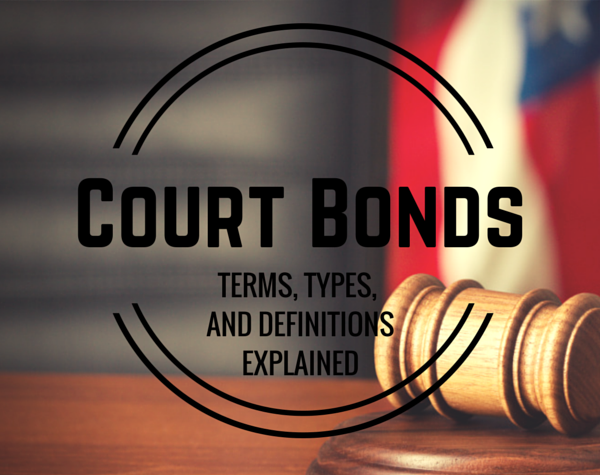
Court bonds in Canada
As a Canadian citizen, you should take the time to familiarize yourself with the various  types of bonds. A court bond is a unique type of bond, which is utilized by the courts, within the country of Canada. These bonds are required in many cases and are commonly utilized in civil court. Within this comprehensive guide, ConstructionBond aims to educate you on everything there is to know about this type of surety bond, its benefits and who precisely needs one.
types of bonds. A court bond is a unique type of bond, which is utilized by the courts, within the country of Canada. These bonds are required in many cases and are commonly utilized in civil court. Within this comprehensive guide, ConstructionBond aims to educate you on everything there is to know about this type of surety bond, its benefits and who precisely needs one.
What Are Court Bonds?
Before rushing forward, you should learn about the basics. A court bond is a name given  to a handful of different bonds, which are utilized in the court setting. Generally, the court requires these bonds, in order to validate a litigant’s credibility and financial stability. If the bonds were not in place, anyone and everyone would be able to file suit and make all kinds of frivolous claims. Therefore, the bonds are capable of helping everyone involved in the matter. Below, you’ll learn more about these bonds, who is involved and who needs to obtain a court bond.
to a handful of different bonds, which are utilized in the court setting. Generally, the court requires these bonds, in order to validate a litigant’s credibility and financial stability. If the bonds were not in place, anyone and everyone would be able to file suit and make all kinds of frivolous claims. Therefore, the bonds are capable of helping everyone involved in the matter. Below, you’ll learn more about these bonds, who is involved and who needs to obtain a court bond.
Three Parties
Court bonds are very similar to other types of surety bonds in the sense that three parties are involved. Below, you fill find a breakdown of these parties.
- Principal – This is the individual, who is responsible for posting the bond. Usually, this is the appellant or a fiduciary.
- Obligee –This is the court, in which the case will be heard and carried out.
- Surety –This is the bond issuer and is responsible for making the guarantee for the principal.
Types of Court Surety Bonds we provide:
- Appeal Bond – Acquired prior to appealing a court’s judgment to have it overturned.
- Executor Bond (Administration Bond) – Protects victims against fiduciary dishonesty and misconduct.
- Probate Bond – Protects the interest of the obligee by demanding the principal to be bonded.
- Guardianship Bond – Acquired by an individual that wishes to be a guardian of another individual.
- Notary Bond – Acquired by notaries to protect their signers.
Who Is Required To Acquire A Court Bond?
When it comes down to it, the requirements vary substantially from province to province and case to case. These bonds can be required for a number of court related reasons. For instance, a fiduciary bond may be required, if the person in question is attempting to gain possession over another individual’s finances or property. In this type of situation, the bond ensures that the one obtaining the bond will not abuse their power and will carry out their duties as agreed upon.
In other situations, a person may be required to obtain an appeal bond, when attempting to appeal a previous judgment. In these events, the bond is required to help prevent misuse and abuse of the country’s appellate system. The bond also helps to ensure that the appellant will abide by the court’s decision. So, you may or may not need a court bond. The requirement depends on your location, as well as the type of action you’re trying to take.

Different Types Of Court Bonds
Now, you should understand that there are several different types of court bonds. Although the courts utilize them all, they’re unique in one way or another. You will be able to learn more about the individualistic types below.
Appeal Bonds
In Canada, it is very common for a court to require appellants to obtain appeal bonds, before they’re allowed to appeal a court’s previous judgment. These bonds are sometimes referred to as supersedes bonds. Take note that this specific type of bond is considered to be high in risk and this makes them somewhat difficult to obtain. In order to obtain one of these bonds, you will need to provide 100% of the minimum collateral. If the appeal is not won, this collateral will be paid out to the claimant.
The purpose of the bond is to help maintain the reputation and effectiveness of the appellate system. By preventing potentially devious individuals from filing an appeal, the court is able to only negotiate and analyze legitimate cases, which prevents delays. If you obtain this type of bond, you are also agreeing that you’ll follow the court’s ruling and will pay all costs, if you lose the appeal.
Fiduciary Bonds
Fiduciary bonds are very common in probate court cases. During these specific cases, it is common for the courts to assign someone to be the fiduciary. In order to become the fiduciary, you will need to obtain the associated bond. Sometimes, this individual will be referred to as a trustee, guardian or executor. Although the bond is commonly used in probate situations, it can also be used as an estate bond, custodian bond, and guardianship bond.
In this type of situation, the bond is put in place to protect the previous property owner from a potentially devious fiduciary. When obtaining this type of bond, you are agreeing that you will perform your duty to the best of your ability. If you fail to do so and abuse your power, the impacted party will receive the initial sum of the bond, as a form of compensation.
Although there are a handful of other types of court bonds, the above two are the most common.
Understanding The Potential Costs
Now, you should realize that there are many differentials associated with court bonds. This remains true, when it comes to the potential costs. In this type of scenario, your  personal credit score will have a much less impact than it would, when attempting to obtain many other types of surety bonds. When it comes to fiduciary bonds, the court is responsible for setting the bond amount. Generally, this amount will be configured based upon the quantity of property or amount of finances in question.
personal credit score will have a much less impact than it would, when attempting to obtain many other types of surety bonds. When it comes to fiduciary bonds, the court is responsible for setting the bond amount. Generally, this amount will be configured based upon the quantity of property or amount of finances in question.
Once the bond amount has been set by the court, the designated fiduciary will need to pay a certain percentage of the agreed upon bond amount. Generally, the percentage can range form to 1 to 3%.
Appeal bonds are enormously different. Again, the court is responsible for determining the cost of the appeal bond. However, in this type of scenario, you will be required to post 100% of the collateral. The appellant will also be required to pay a premium. The premium amount varies and is determined on a case-by-case basis.
Overall
When attempting to file an appeal or become appointed as a fiduciary, you will need to obtain a court bond. Your credit isn’t as important for these types of bonds and you can easily begin the application process online. Just make sure you familiarize yourself with the information above, before attempting to move ahead.
Other Types of Surety Bonds we provide:
- Commercial Bonds – Governmental and local province regulations and statutes.
- Construction/Contract – For construction projects.
- License Bonds – Government bodies generally require you to obtain this type of bond.
To read the frequently asked questions regarding surety bonds: click here